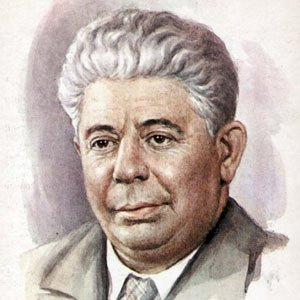Born in Kiev in 1889 and died in Moscow in 1978.
The son of a cattle drover, he revealed musical talent in early childhood; his brothers worked as cinema muscicians, the elder ones sharing their experience with the younger. But coincidence alone enabled this son of a poor family to gain a musical education. In 1914 M. Guelaver, the principal of the St. Petersburg Conservatory, heard him play and took him there to attend his classes; he spent three years in the St. Petersburg Conservatory, earning his living by playing the pianoforte in cinemas and restaurants an learning to compose variety songs.
In 1917, Pokrass returned to his native Kiev and in 1919 he enlisted as a volunteer in the Red Army, where he fought in the ranks of the First Cavalry Division and dedicated many songs to it, among them the “Budenny March”. These songs attracted the attention of the Soviet high Command. In 1921 he was introduced to Marshal Voroshilov, who advised him to go to Moscow, where he lived ever since and where his creative work became recognized. He wrote music for theatrical productions and revues and appeared on the platform as a conductor and pianist. For ten years from 1926 to 1936, he was in charge of the musical section of the Moscow Music Hall and subsequently he assumed the art directorship of the jazz ensemble in the Raiway Workers House of Culture. He wrote the music for many Soviet films and for his work in film music he was awarded the Stalin Prize in 1941. Most of his mass and battle songs where composed in collaboration with his brother Daniel Pokrass.
During the war the Pokrass brothers composed many new patriotic songs, which on many occasions were composed at the front. In 1938 the Soviet Government bestowed upon Dmitry Pokrass the Order of the Red Banner of Labour.


12 thoughts on “Kaminos”
Was Nicholas related to Alexander Saslavsky who married Celeste Izolee Todd?
Anyone have a contact email for Yair Klinger or link to score for Ha-Bayta?
wish to have homeland concert video played on the big screen throughout North America.
can organize here in Santa Barbara California.
contacts for this needed and any ideas or suggestions welcomed.
Nat farber is my great grandpa 😊
Are there any movies or photos of max kletter? His wife’s sister was my stepmother, so I’m interested in seeing them and sharing them with his wife’s daughter.
The article says Sheb recorded his last song just 4 days before he died, but does not tell us the name of it. I be curious what it was. I’d like to hear it.
Would anyone happen to know where I can find a copy of the sheet music for a Gil Aldema Choral (SATB) arrangement for Naomi Shemer’s “Sheleg Al Iri”. (Snow on my Village)?
Joseph Smith
Kol Ram Community Choir, NYC
Shalom Joseph. I just saw your 2024 post by chance… I’m a mostly-retired Israeli journalist and translator. In 2003 I translated into English the content (the objective was to remain true to the meaning, not to cadence or rhyme) of poems and lyrics of 48 of Israel’s most iconic songs arranged by Aldema for choirs abroad singing in Hebrew (the words in the scores are transliterated) but members of the choir lack mastery of Hebrew to ‘know’ exactly what they are saying/singing… The book was titled in English “A Merry Choir” – in Hebrew מקהלה עליזה . See if you can find a copy in a used book store, it is priceless and apparently out-of-print – well worth the search. If not, they may have a copy at Tel Aviv Amenu Museum’s music department – write them and see if they can send it to you. Or – if you will contact me via Whatsapp – (972) 546872768 or via my email – I will try and find the book (it is not where it ‘should be’ so I have to search) and I will photograph the score with my cell and send to you as an attachment. Best, Daniella Ashkenazy – Kfar Warburg.
שלום שמעון!
לא שכחתי אותך. עזבתי את ישראל בפברואר 1998 כדי להביא את בני האוטיסט לקבל את העזרה המקצועית שלא הייתה קיימת אז בישראל. זה סיפור מאוד עצוב וטרגי, אבל אני הייתי היחיד עם ביצים שהביא אותו והייתי הורה יחיד בשבילו במשך חמישה חודשים. הוא היה אז בן 9. כעת הוא בן 36 ומתפקד באופן עצמאי. נתתי לו הזדמנות לעתיד נורמלי. בטח, אבות כולם חרא, אומרים הפמינציות, אבל כולם צריכים לעבוד כמטרות במטווחי רובה!
משה קונג
(Maurice King)
Thank you for this wonderful remembrance of Herman Zalis. My late father, Henry Wahrman, was one of his students. Note the correct spelling of his name for future reference. Thank you again for sharing this.
Tirza Wahrman (Mitlak)
amazing zchuso yagein aleinu, he wrote the famous niggun Lefichuch that is sung in almost every Israeli Yeshiva
My grandmother, Rose Ziperson, wrote the words to his music for a song called Main Shtetele, which he produced. I have the sheet music!